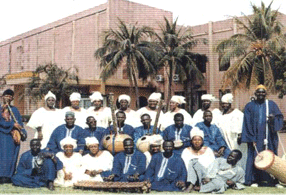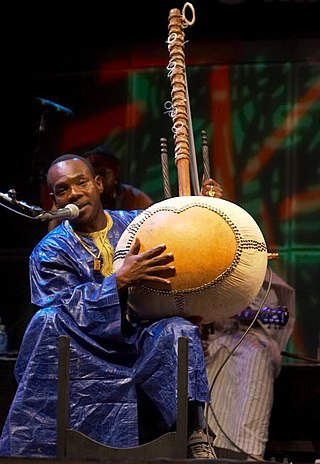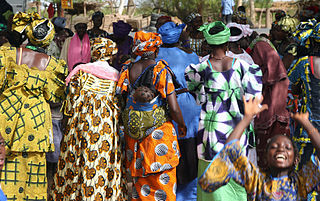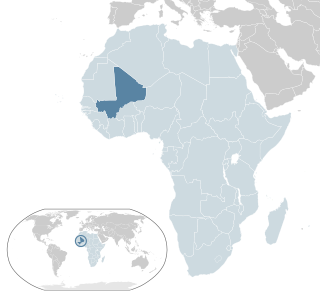Baba Sissoko | |
|---|---|
 | |
| Background information | |
| Born | 8 March 1963 Bamako, Mali |
| Occupation(s) | Musician |
| Instrument(s) | Percussion |
| Website | babasissoko |
Baba Sissoko (born 8 March 1963) is a Malian percussionist.
Baba Sissoko | |
|---|---|
 | |
| Background information | |
| Born | 8 March 1963 Bamako, Mali |
| Occupation(s) | Musician |
| Instrument(s) | Percussion |
| Website | babasissoko |
Baba Sissoko (born 8 March 1963) is a Malian percussionist.
Born and raised in Bamako, Mali, [1] from childhood, he played tamani, often accompanying the traditional female griot during wedding and other traditional ceremonies.
In 1985, he toured internationally with the prestigious Instrumental Ensemble of Mali orchestra, playing the tamani and ngoni. In 1991, he founded his trio, Baba Sissoko & Taman Kan, and began extensively collaborating with top Malian artists and international musicians. His work with Habib Koité is notable as their collaboration lasted 12 years and was widely celebrated. In 1995, Baba Sissoko released his first album with Tama-Kan.
Baba Sissoko's Taman Kan bandmates are Roger Sabal Lecco (who has played bass with Manu Dibango, Miriam Makeba, Fela Kuti, Francis Bebey, Lucio Dalla, and Louisiana Red), and Reynaldo Hernandez (who has played percussion with the Conjunto Folklórico Nacional of Cuba and the Gipsy Kings). The trio celebrates their own cultures (Manding, Bambara people, Sonrai, Yoruba, and Kongo), and incorporates blues, jazz and rock elements as well.
To date, Baba Sissoko has recorded and released more than five albums. He also has taught traditional drum in Brussels, Belgium, and led conferences for the University of Calabria - Art, Music, and Spectacle Centre in Italy. He has lived in Italy since the late 1990s. [1]
In 2015 he collaborated with DJ Khalab on the Khalab & Baba album. [2] [1] [3]
In 2017, he collaborated with Mighty Mo Rodgers on the album, Griot Blues. [4] [5] [6]
(Incomplete)

The music of Mali is, like that of most African nations, ethnically diverse, but one influence predominates: that of the ancient Mali Empire of the Mandinka. Mande people make up around 50% of Mali's population; other ethnic groups include the Fula (17%), Gur-speakers 12%, Songhai people (6%), Tuareg and Moors (10%).

Toumani Diabaté is a Malian kora player. In addition to performing the traditional music of Mali, he has also been involved in cross-cultural collaborations with flamenco, blues, jazz, and other international styles. In 2006, the London-based newspaper The Independent named Diabaté one of the fifty best African artists.

Mali Music is a 2002 album by musician Damon Albarn in collaboration with Malian musicians Afel Bocoum, Toumani Diabaté & Friends, and also featuring a cameo from Ko Kan Ko Sata.
Djelimady Tounkara is a Malian musician and one of the foremost guitarists in Africa.

Habib Koité is a Malian musician, singer, songwriter and griot based in Mali. His band, Bamada, was a supergroup of West African musicians, which included Kélétigui Diabaté on balafon.

Articles related to Mali include:

Donald Moye, Jr., known as Famoudou Don Moye, is an American jazz percussionist and drummer. He is most known for his involvement with the Art Ensemble of Chicago and is noted for his mastery of African and Caribbean percussion instruments and rhythmic techniques.
Mah Damba is a traditional griot singer. She comes from a family of griots: her father, Djeli Baba Sissoko, was a griot and her aunt, Fanta Damba, is also considered a top vocalist.
Lucy Durán is a British ethnomusicologist, record producer and radio presenter. In the 1980s, Durán worked as a curator at the British Library National Sound Archive. She joined SOAS University of London in 1993, and is Professor of Music with special reference to Africa and Cuba, in the School of Arts. She is the daughter of Spanish composer and civil war veteran Gustavo Durán and the sister of poet Jane Duran and author Cheli Duran.

Mamadou Diabaté is a Malian musician known for his work with the kora. He began playing quite early in his life, became known as a musician in the area of Mali in which he lived, and has since moved to the United States, recording several albums.

The culture of Mali derives from the shared experience, as a colonial and post-colonial polity, and the interaction of the numerous cultures which make up the Malian people. What is today the nation of Mali was united first in the medieval period as the Mali Empire. While the current state does not include areas in the southwest, and is expanded far to the east and northeast, the dominant roles of the Mandé people is shared by the modern Mali, and the empire from which its name originates from.

Ballaké Sissoko is a Malian player of the kora. He has worked with Toumani Diabaté and Taj Mahal, and is a member of the group 3MA with Driss El Maloumi and Rajery.

Reunion is a live album recorded at Centro Rai di Produzione Radiofonica in Rome in January 2003 by the Art Ensemble of Chicago and released on the Italian Around Jazz label. It marked the return of Joseph Jarman to the group and features performances by Jarman, Roscoe Mitchell, Malachi Favors Maghostut and Don Moye with Baba Sissoko. It is the first live Art Ensemble album to be released following the death of founding member Lester Bowie.
Mamadou Sidiki Diabaté is a prominent Mandé kora player and jeli from Bamako, Mali. He is the 71st generation of kora players in his family and a son to Sidiki Diabaté.

Red Earth is a 2007 studio album by Dee Dee Bridgewater. It carries the subtitle "A Malian Journey" to celebrate and explore her African and Malian ancestry. The album brought her the seventh nomination for Best Jazz Vocal Album at the 2008 Grammy Awards. On Billboard's Top Jazz Album chart it reached Number 16.

Mighty Mo Rodgers is an American electric blues musician, singer, songwriter, and record producer, who has released eight albums to date. He has been influenced by the work of Aretha Franklin, Bobby Bland, Eddie Boyd, Jimmy Reed, Otis Redding, Sam & Dave, and Willie Dixon.
Bako Dagnon was a Malian griot singer. She is considered to be a popular representative of Mandinka culture and has released several records in local languages.

The 1968 Malian coup d'état was a bloodless military coup in Mali staged on 19 November 1968 against the government of President Modibo Keïta. The coup was led by Lieutenant Moussa Traoré, who then became the head of state.

New Ancient Strings is a studio album by the Malian musicians Toumani Diabaté and Ballaké Sissoko, released on 22 June 1999 by the British label Hannibal Records. The album comprises eight instrumental duets composed by Diabaté for kora, a stringed instrument of West African music. Diabaté and Sissoko are esteemed as the best and the second-best kora players of their generation, respectively. Their duets were recorded in a single live take within a marble hallway of Bamako's conference centre on the night of 22 September 1997, coinciding with Mali's Independence Day.
Kassé Mady Diabaté was a Malian singer, musician and griot. His soft and particular voice with deep undertones – an atypical characteristic for a griot – earned him the nickname "The golden voice of Mali". He is considered, together with Salif Keita, as one of the greatest Mandinka artists of his generation.